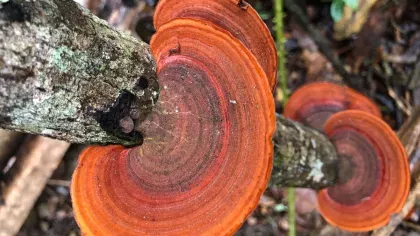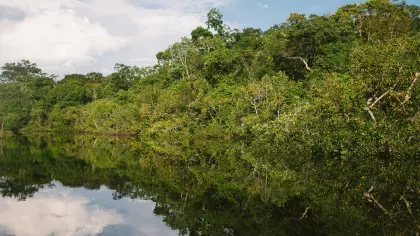2 February 2021
Nature is our greatest economic asset
The Dasgupta Review calls for urgent and transformative change in how we think, act and measure economic success to protect and enhance our prosperity and the natural world.

If you can’t do something forever, it’s not “sustainable”.
Today, we’re using the equivalent of 1.6 Earths to provide the resources we need to keep our economies running.
The logic is simple: this cannot go on.
Imagine that, in addition to your normal occupation, you owned a piece of land covered by forest.
At any certain year, you could either keep the forest as is or, if things got a bit tougher financially (perhaps you needed some extra income to pay for your child’s studies, or you lost your job due to a pandemic) you would have the option of selling off some timber. With the forest left, you would have options.
Without it, the options would be considerably fewer; you might still sell the land, but your options would then end.
The same applies to the world’s nations.
Keeping nature means maintaining the options for a country’s economy and its people – similarly to mineral and oil assets. Degrading it means instead reducing those options.
In forests and other ecosystems, timber is but one asset. There are many more: from new sources of medicine, fibre, fuel, and building material, to crops that could nourish millions of people.
As our scientists and collaborators have recently shown, plants and fungi hold untold properties that could help boost societies and safeguard their sustainable future.
They too, should be regarded as assets, and invested in, in the same way as we invest in our more recognised assets.
With deforestation rates around the world continuing to soar, all these options - our assets - are now vanishing, leaving poor countries with even poorer prospects.
It’s time to say farewell to one of the biggest and longest running myths in economy: that social development must come at the cost of nature.
That this dichotomy is false has long been articulated and promoted by the conservation movement, but to little avail.
Around the world, countries and businesses have continued to empty natural resources for short-term economic profit.
Now, more than ever, someone needed to tell them this cannot continue – but who would they listen to?
This is where the Dasgupta Review on the Economics of Biodiversity, released today, comes in.
Written and led by one of the world’s most respected economists, this 600-page global report not only speaks the language that other economists, policymakers and companies will understand and appreciate; it presents a compelling narrative that business as usual is no longer an option for the vast majority of them and, crucially, it outlines a new framework for how we value nature in our economic systems and outlines actions that need to be taken.
Be it for the love of nature, or for the love of profit, the reader (and specifically economic decision makers governments and the business and financial sectors) will invariably understand that the only way forward is the way of true sustainability.
Our relationship with nature must change, concludes the report.
From the way we value, and use nature, to the plethora of services and benefits we get from it – many of them far from material – and the metrics we use to define progress and economic success.
This massive publication of global scope, supported by a broad consultation among scientists and stakeholders, doesn’t contain all the answers. Yet, it contains enough of them to trigger a game change.
Just as the Stern Review on the Economics of Climate Change soon became the standard reference to motivate governments around the world to act, I personally believe this review will be the turning point in the way biodiversity is valued, sustainably used, and protected.
In the course of the study the Review team consulted across the financial, public policy, science, economic and business sectors. I’m honoured that colleagues and I at the Royal Botanic Gardens, Kew were asked to provide evidence, advice and suggestions from its early inception to final stages. I urge everyone to read the Review, and to consider the specific actions recommended to achieve the transformational change we need, and to act.
As the Review concludes: ‘relying on institutions alone to curb our excesses will not be enough. The discipline to draw on Nature sustainably must, ultimately, be provided by us as individuals.’
Launch event
Watch the launch event via the Royal Society YouTube channel.



